Original post: December, 2019
It’s no secret this blog is mainly about LuNa…
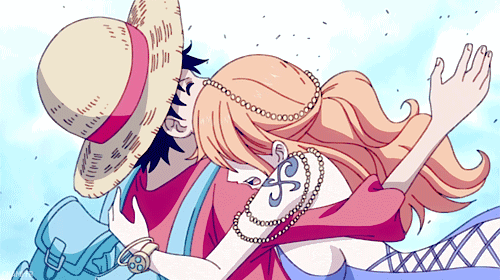
…and NaLu
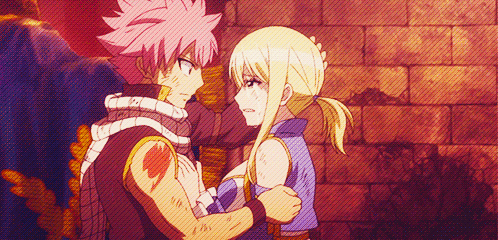
And several post made here are meant to showcase how their respective stories build them up through consistent bonding; defend their position as potent relationships by means of evidence and logic; or both.
We know standing next to each other in the same panel or frame are not “moments” if the context and/or the story doesn’t turn them into a meaningful interaction.
We know a girl slapping a guy is not something inherently romantic, and it’s not a defining trait of a potent relationship, specially when context says otherwise.
We know that brief rescue scenes are not always the sign of a potential romance as there are several elements needed to turn them into actual moments for a pairing
But, there are some arguments that persist because shallow shippers think they give meaning to their premises, disprove the potential another pairing has, or both. This post will deconstruct a couple of those arguments used to argue against LuNa and NaLu’s position as potent relationships in their respective stories.
1) Romantic pursuit Vs. Consistent bonding
I was going to call this one the “Touka Argument”, or Touka’s Rhetoric. Naming it after FT’s Touka…
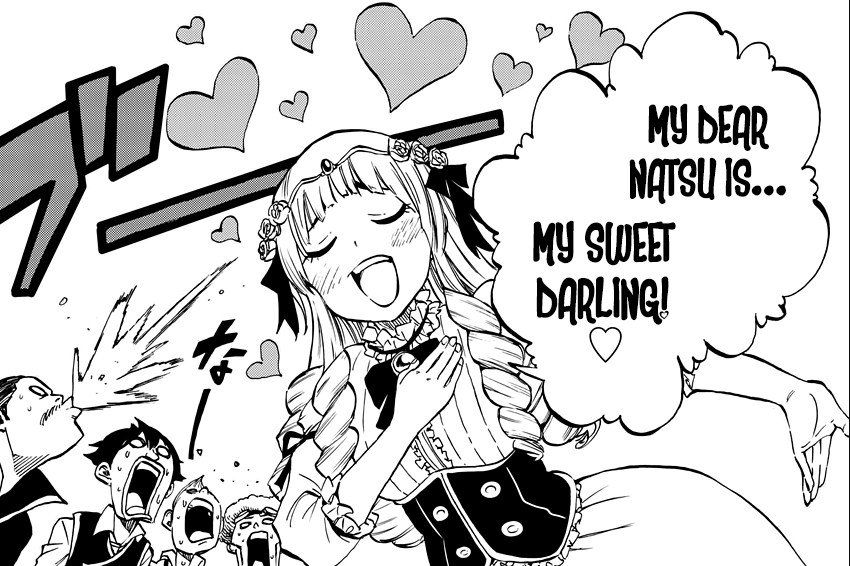
…she seemed to be the embodiment of nearly everything shippers argue against relationships as LuNa and NaLu until we got a comedic plot-twist worthy of a trolling writer.
Still, the argument goes a little bit like this: any one-sided pursuit of romance should become part of the endgame pairing. It doesn’t matter if the story doesn’t take such “affection” seriously, it doesn’t matter if it is meant to be a joke with little to no weight, all that matters is the character actively looking for romance while proclaiming “love.”
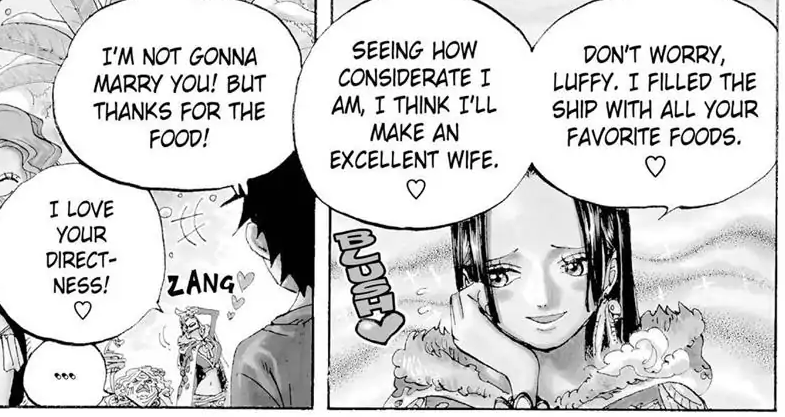
A character who appears much later in the storyline openly expressing “love” for the MC. Meanwhile the MC shares far more development with a romantically inactive girl.
Some shippers may argue that the girls or guys who are actually “in love” are the ones who will win their object of affection. Others may admit this is a extremely subjective matter as some of these girls end up winning, which makes it hard to analyze this stuff properly. But, there’s one thing that helps people to keep an objective perspective: development
If we take a look at relationships like Gruvia from Fairy Tail, we get to see that their most powerful scenes are not the ones that involve the characters being all mushy over each other, but the moments of actual emotional significance; actual build-up…
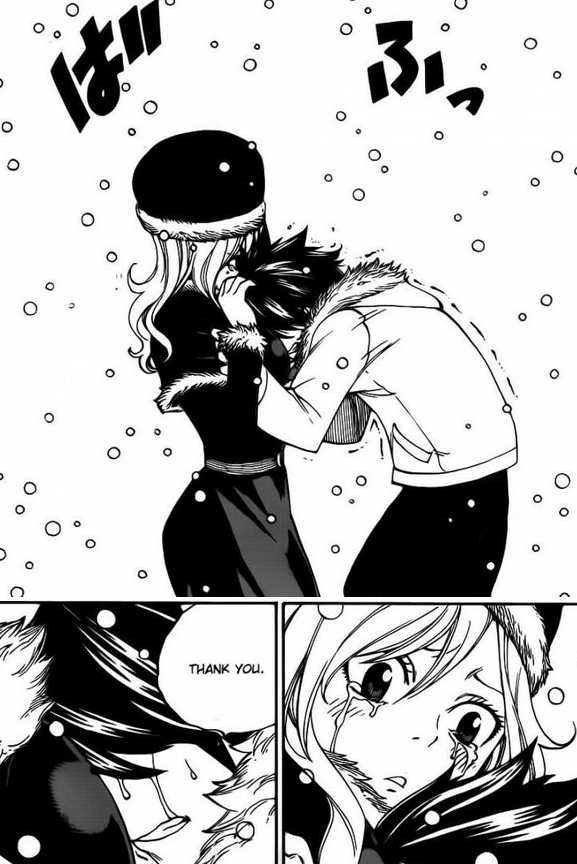
…created by impactful moments
Some of Hiro Mashima’s works prove he’s aware that what truly matters in this particular regard is not how often a character makes claims of love, but how much development she or he has with a significant other.
What about Eiichiro Oda and his works? We got one notable example from the Whole Cake island arc
One sincere gesture of kindness from Sanji (the local pervert and Casanova wannabe) was enough for him to get to Pudding’s heart…
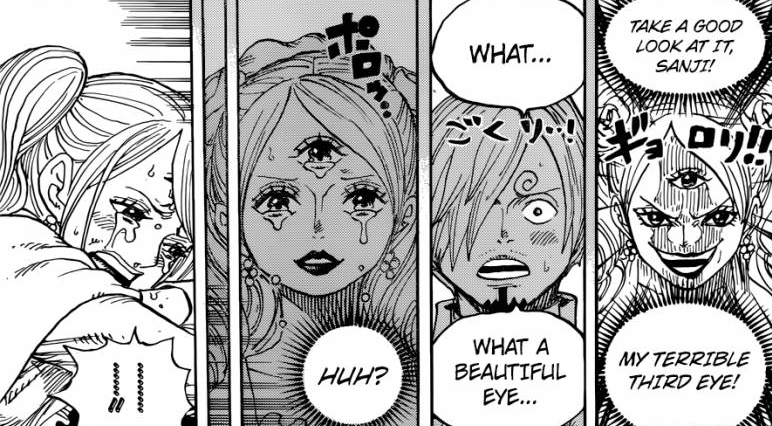
…when he shattered the image she had of herself as monster with that gesture, and later an armor-piercing question, she ended up falling for him as he was the only person on that island that saw her true face and still deemed her as a beautiful woman instead of a monster. Sanji had such impactful moments with Pudding without going “horny” mode on her.
Other authors know that this kind development is needed for the logical progression in both good storytelling and decent characterization. They may not say it out loud, but their works speak for themselves while showing even characters who are not looking for romantic love can eventually develop such bonds.
Take a look at relationships like Kenshi and Kaoru from Rurōni Kenshin…
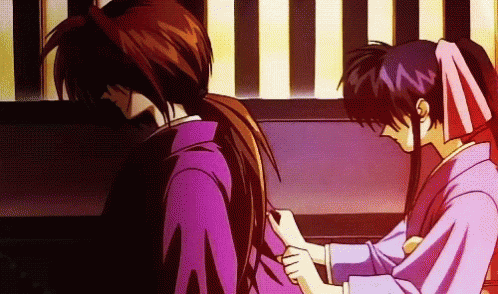
…they became an item, despite neither of them being romantically active, because they bonded over time, supporting and caring for each other, to the point of developing a much deeper connection. No over-the-top corny lines nor becoming all horny on each other; it was just consistent bonding, which ultimately triumphed.
It’s shouldn’t come as a surprise given the author of Rurōni Kenshin mentored Eiichiro Oda.
And to add it more to the irony, there was another girl interested in Kenshin who got a role much greater in the anime than the manga, and who was more mild-tempered, feminine, and seductive.
Another mangaka who understood this matter is Seishi Kishimoto, brother of Masashi Kishimoto (of Naruto fame), and author of O-parts Hunters.
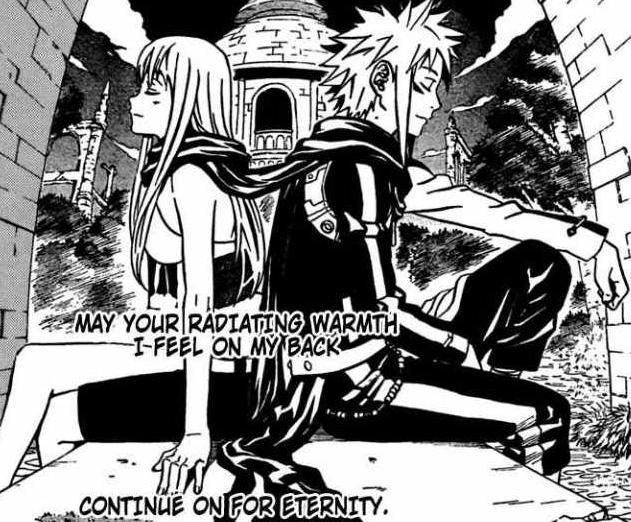
The moments shared by the main characters led Ruby to become Jio’s emotional support, and both of them to get emotionally attached to one another. Another girl was interested in Jio, but consistent bonding made Jio and Ruby’s connection remain as a potent relationship… as well as some other plot points.
And of course, there’s the critically-acclaimed Fullmetal Alchemist (Brotherhood for anime-only watchers) by Hiromu Arakawa.
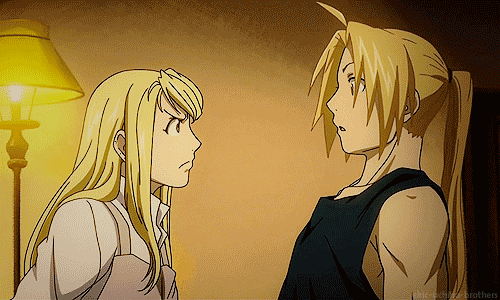
Edward and Winry. Two well-written characters who weren’t romantically active before ending up together, yet their relationship and later upgrade made total sense… I could name Roy and Riza too, but that would be overkill.
The point is that it’s not the romantic pursuit (or gag-like claims of “love”) that makes or breaks a pairing; it’s all about the moments that leave an impact along with shared experiences which give a strong companionship the potential for a relationship upgrade.
2) Every shonen story is the same story?
While this argument sounds ridiculous, it serves as an umbrella for several other claims some shippers may use.
A lot of anime fans know that most popular shonen stories, such as Dragon Ball, usually feature underdeveloped relationships. So, more often than not, shippers may claim or imply significant moments and actual development mean little to nothing in a shonen story. This reasoning can be easily mixed with the “romantic pursuit” argument.
Another related argument is the “informed attribute,” which means you can off-screen the whole relationship and just let a character or narration “tell” you how a pairing happened instead of “showing” you how they developed. Basically, a violation of “show, don’t tell.”
While it’s true several shonen stories share similar tropes, the more you examine each story, the easier it becomes to tell them apart.
Eiichiro Oda wrote a story that could easily fit the concept of “romance,” as in a dramatic narrative treating themes such as heroism, idealism, mystery and adventure…
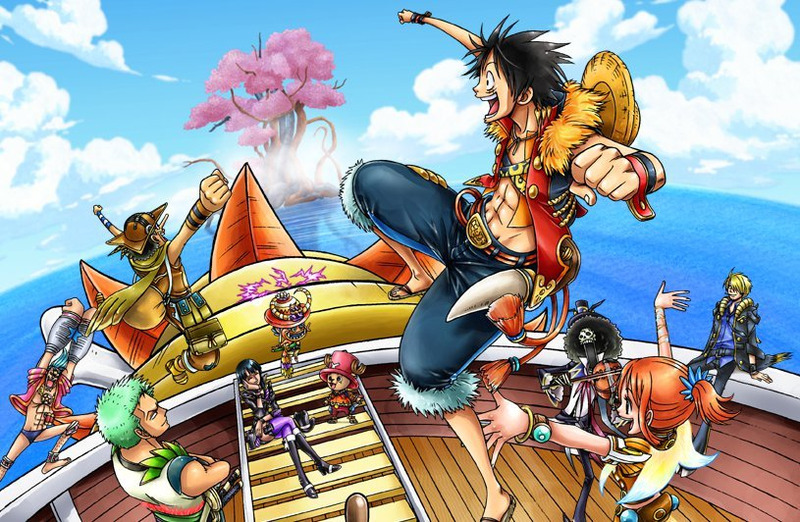
In fact, according to Sugita, a former One Piece editor, “Oda revealed that One Piece was something of a deliberate subversion of Dragon Ball through having a vastly more complex story and characters, while Dragon Ball is a manga infamous for its simplicity.”
This is consistent to Oda’s own statement: “I write ONE PIECE as dramatically as I can. If I had written a pure battle manga, it would have been easily defeated by Dragon Ball.”
Given the amount of themes the series covered and the engaging emotional narrative, the argument of this story being the same as every other popular shonen doesn’t hold up. The characters are all bound together as true companions not by a desire to become “stronger,” but because they’re “in love with adventure” as the author put it.
What about Fairy Tail? Hiro Mashima wrote a fantasy shonen series centered around thematics that are common in other shonen stories: Companionship and Family.
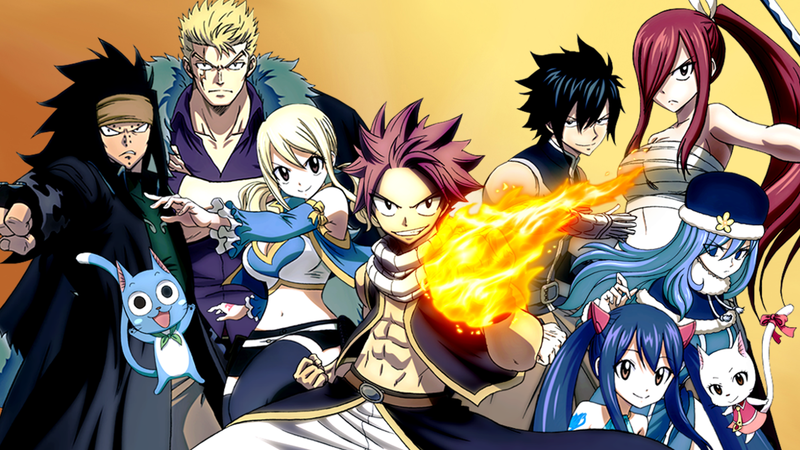
While some people already commented how the manga seems to have strong similarities with One Piece, Hiro Mashima had his own ideas when making the story. As he himself said once: “Usually a shonen manga starts with just a main character, who then slowly accumulates his or her allies as the story progresses. But in the world of Fairy Tail, everybody pretty much knows each other at the beginning. That was sort of what I was going for.”
In another interview he even stated one of the thematic differences in relation to his previous work: “Rave Master was about friends saving the whole world, but Fairy Tail is about closer-knit relationships.”
This is consistent with what we’ve seen in Fairy Tail, as the titular guild is all about that theme, how different people of several backgrounds are connected by intimate bonds and the search for exciting adventures.
What about the characters?
Both Eiichiro Oda and Hiro Mashima (just like many other mangakas) grew up watching and/or reading Dragon Ball. But, are their main characters Luffy…
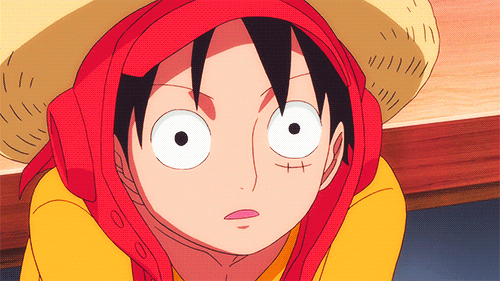
…and Natsu…
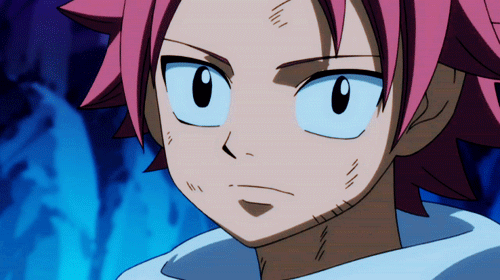
…just mere replicas of Goku and other shonen heroes?
It’s true that many authors follow the shonen hero archetype when writing the protagonist of a series. Both Luffy and Natsu are golden-hearted idiot heroes, and both of them have personalities that reflect the idea of “No Challenge equals No Satisfaction.”
But, unlike Goku their ultimate aim is not all about following an endless cycle of self-improvement. At their core, both Luffy and Natsu are thrill-seekers who are constantly looking for fun and adventure.
Luffy is all about freedom, and even if he’s not the sharpest tool in the shed, he can still display actual leadership qualities when the situation calls for it. Natsu, like some other of his guildmates, is a mischievous trouble-maker but still pretty much the embodiment of the values of Fairy Tail.
The more you examine both characters, the more differences you can find…
All of this is related to shipping mainly because people may claim “every shonen story is the same story” to justify pairings that do not have enough canon material supporting them.
So, if the hero and the heroine have a far more substantial development and actual chemistry, shippers who oppose such characters getting together may imply the following: “if several popular mangakas make their official couples with no regard for moments or build-up, why Oda or Mashima should be any different.”
Because each author is different, and even if their stories use similar tropes from time to time, elements like themes, purpose, focus, plot, and characters will vary from writer to writer.
3) Anime Vs. Manga
‘It’s easier to watch a series than read a story’
Which is why whenever a manga gets an anime adaptation, if the story is good, its popularity rises.
However, sometimes the directors and writers of the anime do not share the same vision as the mangaka. And people who are up to date with both mediums can perceive such differences. Dragged out fights, OOC moments, inconsistencies with plot points from the source material, etc. are common place in some adaptations.
But, some directors and other staff members take some liberties to add “shipping fuel” according to their own views and taste.
I apologize in advance if this comparison offends someone, I’m just using it as an example. The anime adaptation of Bleach made by Studio Pierrot featured some ship tease…
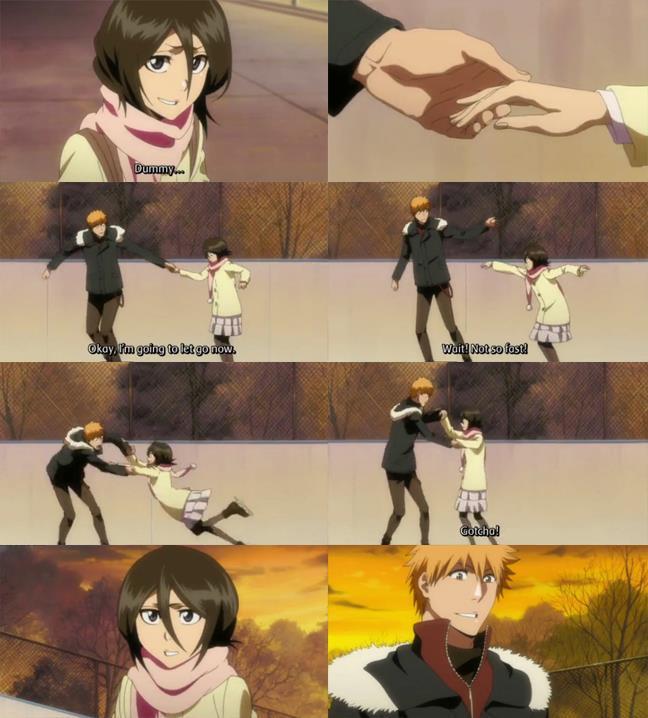
Such scenes weren’t written by Tite Kubo, the author of Bleach. And they could easily pass as something “romantic.”
However, during an interview, one of Bleach’s editors, Toya Taichi, stated that “in Kubo sensei’s mind, Orihime is the heroine character and Rukia is a comrade” and he later summed it up as “feeling like a pal” (相棒 in japanese).
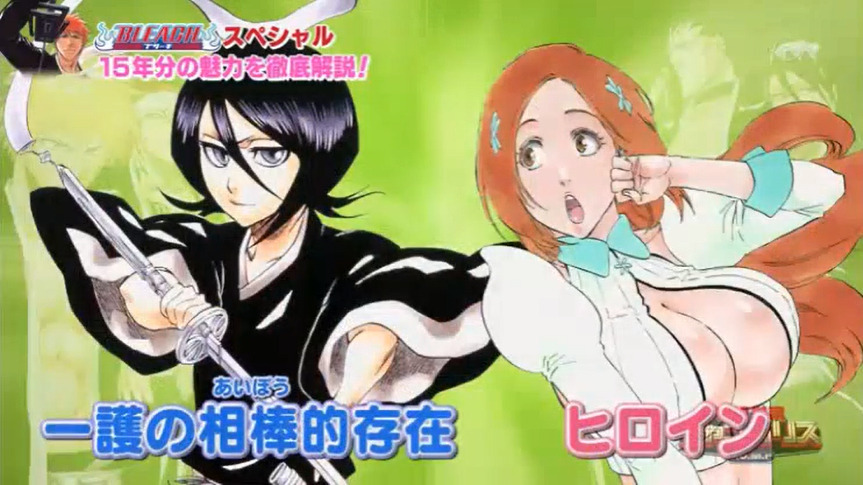
When it comes to modern japanese storytelling, the term “heroine” (ヒロイン in japanese) is interchangeable with “love interest.” Orihime herself was even present in the Shonen Jump heroines covers. But, people who take filler scenes as the real deal may think otherwise.
When it comes to Fairy Tail, A-1 Pictures did a decent job in adapting the story but they also added shipping fuel, small things like Gray following Lucy and getting teased by Happy for it, or the big things like the non-canon expansion of the flashbacks involving Lisanna, which some people still treat as the signs of endgame pairings.
People who watched this version before reading the manga are more prone to overhype relationships that have little to no supporting evidence from Mashima’s works. Fortunately A-1 Pictures toned it down later, too bad some shippers never forget…
If we talk about One Piece, the story is very different to say the least. TOEI Animation didn’t stop in this regard, as some people may recall I already posted several of the changes they made for the sake of ship tease, and unlike A-1 Pictures they keep going and going with the moments they keep adding being more and more blatantly shippy (specially with Nami and Sanji) as time goes on.
Since One Piece is very long-running manga, more and more people only watch the anime and they take all those additions as the real deal despite the heroine of this story sharing far more development and solid chemistry with the hero.
However, not every fan is into well-developed relationships, so not every manga-reader will go LuNa/NaLu. Same could be said about anime-only watchers, as not all of them are swayed by filler, so not all of them will disregard LuNa/NaLu if they like consistent bonding.
The point is that the anime adaptation has a strong influence in how the fans perceive the story, the characters, and the bonds they build. And not every anime adaptation presents a favorable image of the in-canon premises made by the mangaka.
Here’s a little bonus:
Who’s the One Piece heroine according to Oda?
When talking about Strong World, the movie he wrote, Oda said “I really wanted to make a ‘hero saves the heroine’ story.“ A movie about a hero (Luffy) saving the heroine (Nami). He added: "You might think otherwise, but I had no intention of bringing in someone new to fill that [heroine] role. So when I had to think about whom to use for it amongst the straw hats of course that meant Nami.”

He also stated in 2019, when an interviewer addressed the fact his wife is similar to Nami, "They say a mangaka often marries a person who’s similar to the heroine.”
Across the several years the manga had been going, Nami often appears in the Shonen Jump heroines covers due to her role in One Piece.
You can see the latest Jump heroines poster here
Who’s the Fairy Tail heroine according to Mashima?
One of his latest works (HERO’S) answers this question…
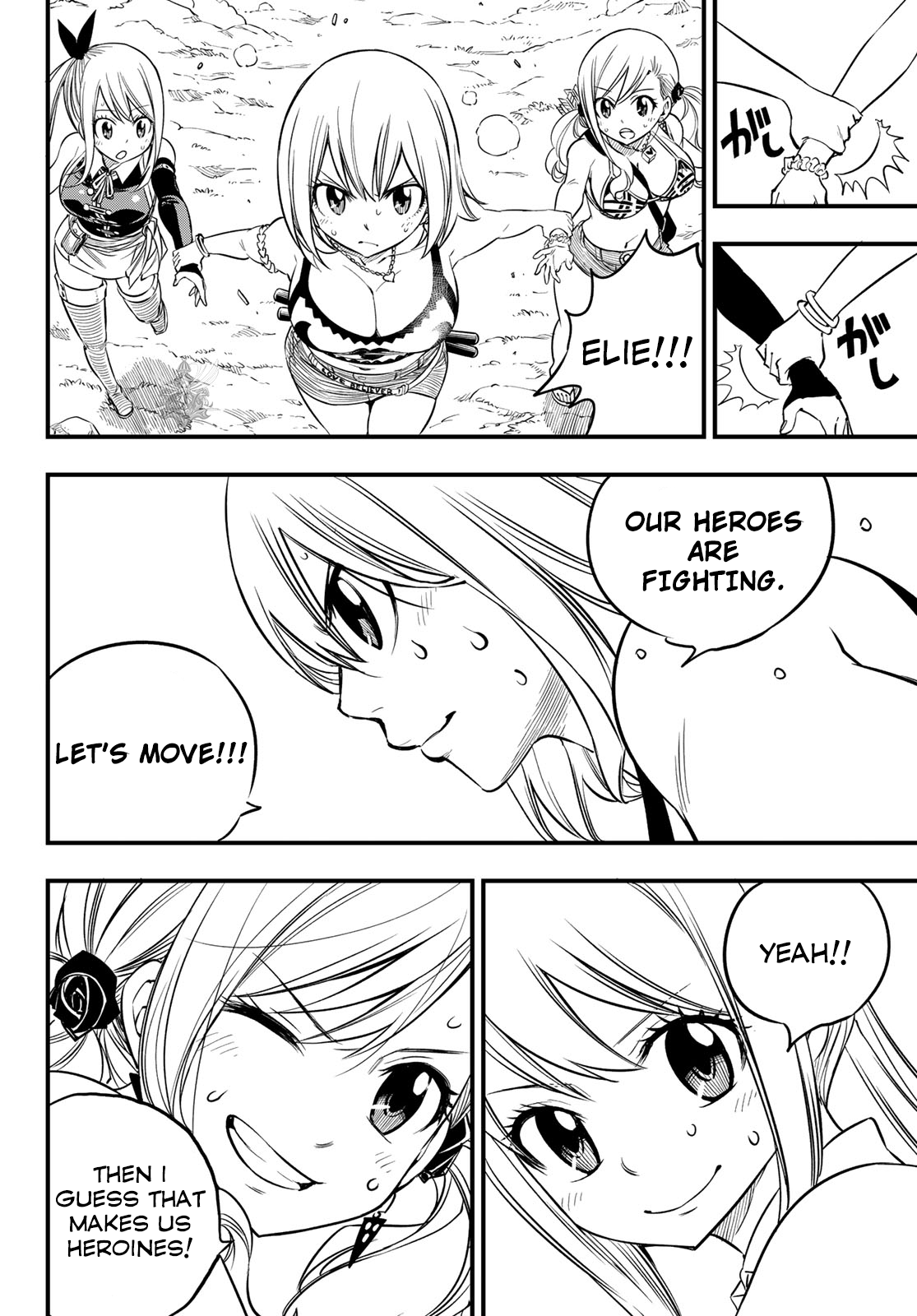
Context: Ellie is talking about Haru, Natsu, and Shiki (the heroes of Rave, Fairy Tail, and Edens Zero). Each one of these girls has the role of “heroine” in each of their respective stories. One of them even ends up with the hero.
BONUS: The Elephant in the room
As you probably noticed, I used a lot of official statements to back up my post. However, even those who oppose LuNa and Nalu use those kind of statments…
In the case of One Piece, several fans considered “romantic love” a concept completely foreign from the series due to a couple of quotes from the author. When asked about this particular subject, Oda stated that the members of Straw Hat crew are “in love with adventure.” And later when asked again, the mangaka said that since this is a shonen story “romance isn’t depicted.”
Based on these answers, several fans created the myth of “romantic love” not existing in One Piece. Many held onto this conclusion with so much intensity that they always dismissed the bad girl Alvida’s obvious attraction to the hero (Luffy).
However, as a clever and perceptive reviewer pointed out we’re talking about the same author that once claimed he doesn’t kill characters and went as far as to say “I hate when supposedly dead characters come back to life.” Yet his story has a couple of “supposedly dead” characters who turned out to be alive. No spoilers here.
Some of his statments are meant to be taken with a grain of salt. He said “romance wasn’t depicted” but as of recent years it’s been a thing in One Piece…
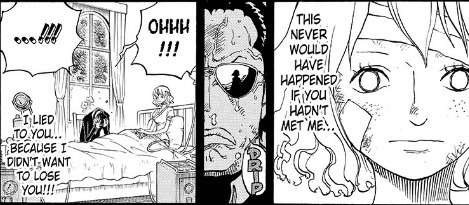
…Señor Pink and Russian are one example of how traditional romance gets integrated in both story and characters. So, using the author’s words to invalidate all possibility of romance in One Piece no longer works.
Ironically, haters take Oda’s old claims literally when talking about Luffy, but they completely forget about it as soon as someone mentions Nami or Robin in this particular regard. A clear display of a blatant double-standard…
When it comes to Fairy Tail, some haters love to quote that Natsu and Lucy are “more than friends but less than lovers.”
Yet, they choose to ignore that in recent years, when asked about the relationship between these characters, Mashima himself replied: “I feel that the Natsu and Lucy ship is more suitable.”
Some time before that statement, during a New York Comic Con, when asked what he feels is “right” in this regard Mashima held up his drawing of Natsu and Lucy…
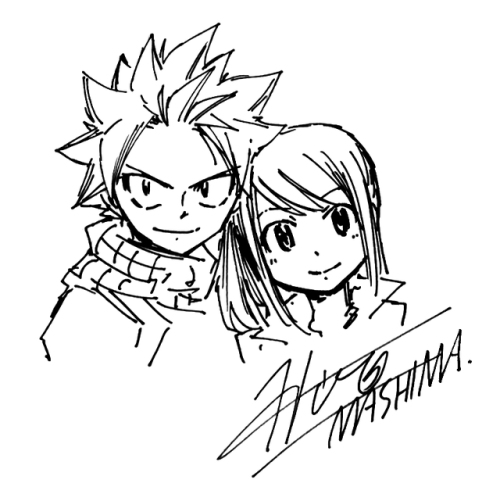
…so everyone could see his answer to the question.
So, using Mashima’s old quote to deny the plausibility of a relationship upgrade here and there is not going to work either.
If people want to defend a pairing or prove a potent relationship has what it takes to become canon, they should try to stay true to the author’s works, and the story’s internal logic, instead of trying to find a way around them and/or promoting a baseless process of elimination, all to justify another premise.
Consistent bonding, chemistry, and natural development coming from the author’s works should be superior to mere rethoric, hype, and/or anime filler

No hay comentarios:
Publicar un comentario